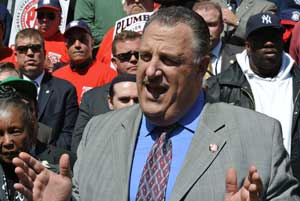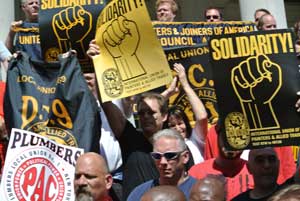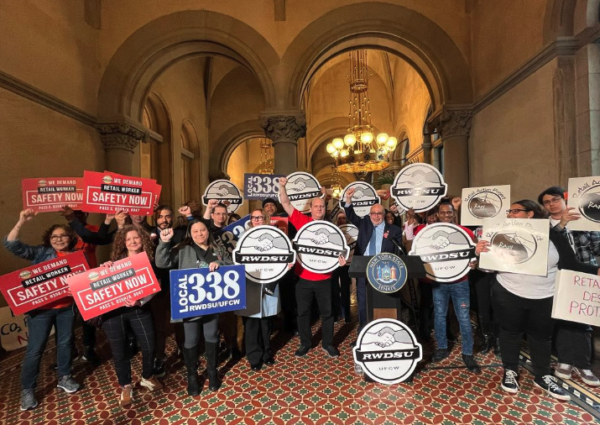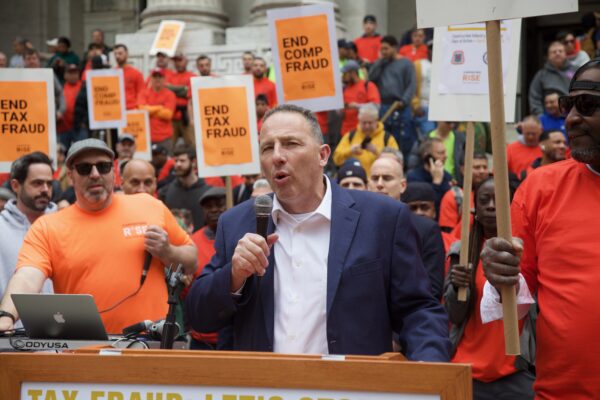April 20, 2012
By Marc Bussanich, LaborPress City Reporter
The New York City Central Labor Council held a presser on the steps of City Hall on Thursday, April 19 to announce that it will be joinder to a lawsuit filed by some of the city unions against Mayor Bloomberg’s Executive Order to rescind prevailing wages set by the City’s Comptroller’s Office that date back almost 120 years.
The CLC’s President Vincent Alvarez announced, “We are here today to announce that the workers affected by the City’s action will be filing a legal challenge to the Executive Order and that the Central Labor Council will be signing on as supporters of that lawsuit.”
Alvarez added, “We don’t believe that the City has the authority to unilaterally restructure long-standing wage agreements and we certainly don’t agree that these types of decisions should be made without a transparent process and a good-faith dialogue.”
According to the CLC, about 9,500 workers who work as plumbers, teamsters, electricians, carpenters, operating engineers and other titles will see their livelihoods endangered because of degradation in pay and benefits.
The Mayor claims that 97 percent of the city’s workforce is covered by collective bargaining agreements and therefore the 9,500 members, who are part of a diverse group of 50 unions totaling 95 different locals, should also be paid via CBAs as well.
The Mayor also claims that the wages the Comptroller’s Office has set for the workers are 50 to 100 percent higher than the private sector workers doing the same work. But the unions vigorously deny that claim, arguing instead that “wages are pegged to what’s paid in the private sector and, as mandated by NYS Labor Law, Section 220, wages for City employees have never risen above the prevailing wage in the private sector.”
The anger at City Hall was palpable as different union leaders expressed outrage over the Mayor’s unilateral decision to issue the Executive Order that potentially dials back wages for union members and takes authority out of the hands of another elected official, John Liu.
Gary LaBarbera, president of the Building and Construction Trades of Greater New York, said that one disturbing aspect of the Mayor’s action is that there was no dialogue with labor before the Executive Order was issued.
“There’s been 100 years of labor relations in this City. But in 2012, it broke down. We can’t allow an elected official, including the Mayor, to change the rules with the stroke of a pen.”
LaBarbera also noted, “The Mayor’s action should also be a concern to the public because he has, via the Executive Order, taken authority away from another City officer.”
Also contributing to the union’s wrath is that the Mayor apparently signed the order two days before it was made public. NYS AFL-CIO President Mario Cilento noted, “By deciding that he was going to make this decision and announce it afterwards without first speaking to any labor leaders, he showed a clear disregard for working people.”
Labor lawyer Harry Greenberg, whose firm will be filing the lawsuit on behalf of the unions, would not provide specifics of the impending lawsuit but said, “The Executive Order that the Mayor signed on April 10, but didn’t notify the unions until April 12, violates NY State Civil Service Law, the City’s Collective Bargaining Law, the NY State Labor Law, Section 220, and various other statutes. We look forward to filing the appropriate actions shortly.”
William Lacey, Director of Civil Service Affairs for the NYC District Council of Carpenters, said the Executive Order, as written, immediately impacts new hires and then eventually existing members.
 “The contracts we had in place before April 11 [one day before the order was issued] for new hires working under 52 titles no longer exist. And when the contracts with the City end for existing members, their benefits, including wages, annuity, sick and vacation time, could be cut up to 20 percent.”
“The contracts we had in place before April 11 [one day before the order was issued] for new hires working under 52 titles no longer exist. And when the contracts with the City end for existing members, their benefits, including wages, annuity, sick and vacation time, could be cut up to 20 percent.”
Jack Kittle, Political Director for IUPAT DC 9, challenged the Mayor’s claim that three percent of the city’s workforce is earning higher wages than the private sector thanks to the comptroller.
“Wages are not technically established by the Comptroller’s Office. Instead, prevailing wages are established based on a survey of the wages paid in the private sector domain, as well as negotiations to reach an agreed upon wage between employers and employees. The number is not magically picked by the comptroller, but is a real free market wage.”
The Mayor’s office did not return a request for comment in response to the unions filing a lawsuit. marc@laborpress.org



